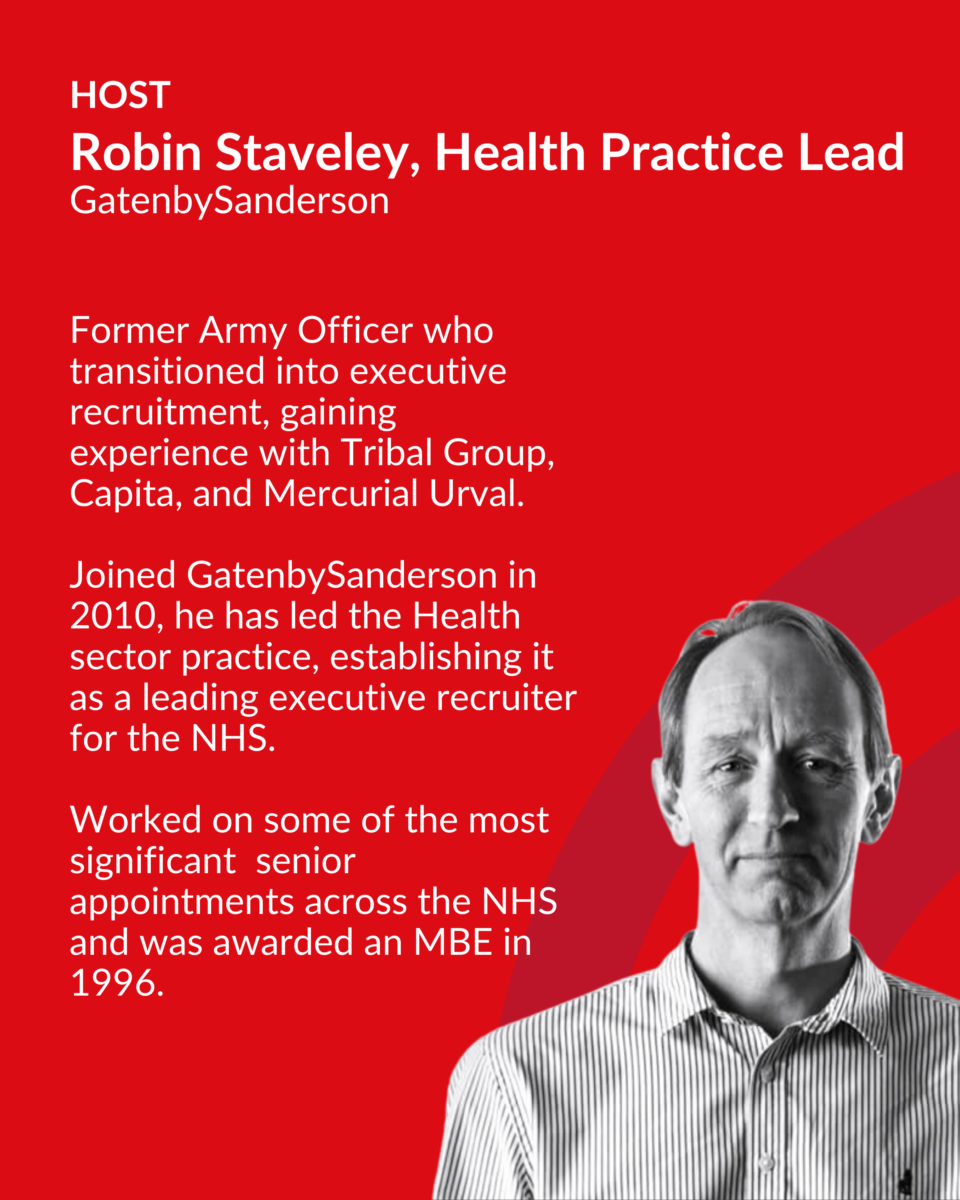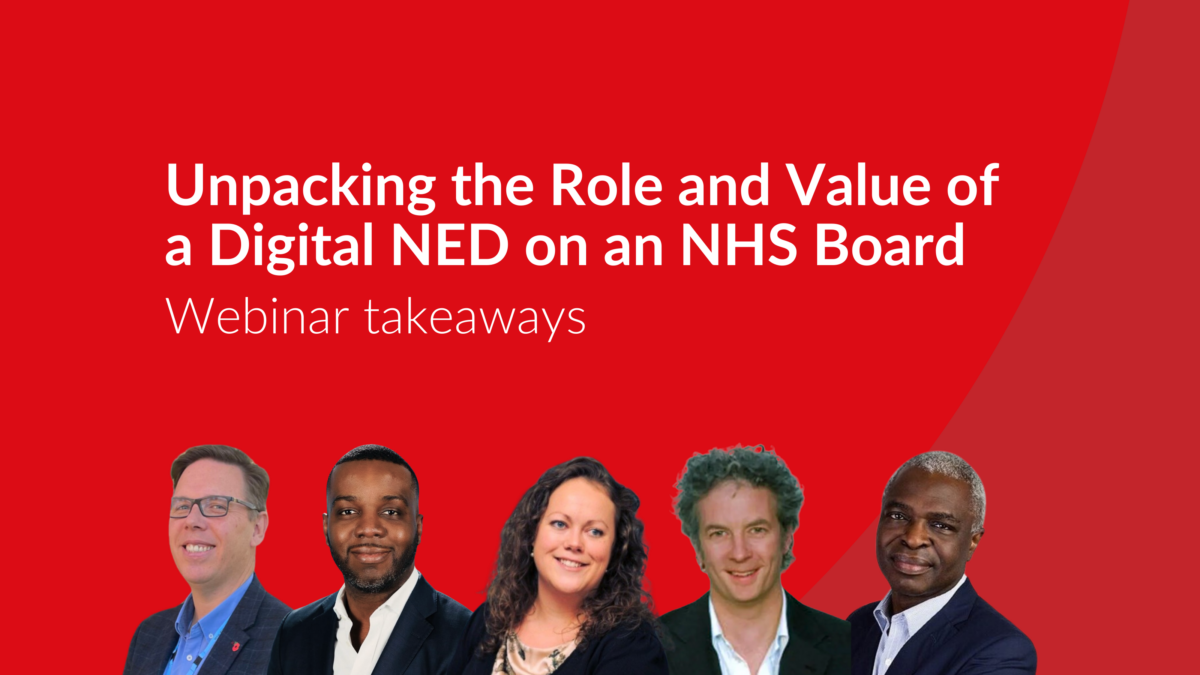In March we unpacked the role and value of a digital NED on an NHS Board through a dynamic webinar that bridged the world of healthcare, technology, and leadership.
But what does it really take to be a NED in the NHS? And how can Trusts maximise value from these roles? The need for innovation has never been greater—but making meaningful progress isn’t just about adopting new technologies. It’s about leadership, mindset, and having the right people around the table.
Our recent GatenbySanderson webinar brought together NHS Chairs, NEDs, and digital leaders from across sectors to explore the role and value of Digital Non-Executive Directors (NEDs) in driving innovation, improving outcomes, and shaping strategy.
View the webinar recording below. 👇
Speakers:
Experienced Digital NEDs who have transitioned from the private sector into NHS board roles, including:
Wol Kolade,
Deputy Chair,
NHS England
Don Iro,
NED,
Ashford & St Peters Hospitals NHS FT
David Crawford
,
NED,
Norfolk Community Health and Care NHS FT
What emerged was not just consensus—but challenge, passion, and thoughtful provocation. It was a conversation about people, systems, leadership and impact. And it made clear that the future of the NHS depends not just on digital capabilities, but on the confidence to think and lead differently.
Key takeaways: Seeing the Bigger Picture
One of the clearest themes from the session was the complexity of the NHS itself as a system – not a single organisation. This brings inherent challenges to digital transformation, including interoperability, legacy infrastructure, and varied levels of digital maturity.
Yet it also reinforces why digital leadership is so essential. As one speaker put it:
“Digital can no longer be seen as a back-office function—it’s now fundamental to workforce productivity, patient experience and clinical safety.”
Another panel member remarked:
“There’s a lot of spin about digital maturity, but the reality is mixed. In many places, we’re still building on sand.”
While there is inspiring innovation across many parts of the NHS, other areas remain under strain facing technical debt, cybersecurity vulnerabilities, and underfunded infrastructure. As one contributor noted bluntly:
“It’s difficult to talk about AI transforming the NHS when we only just got multi-factor authentication rolled out.”
From Digital ‘Annex’ to Strategic Priority
There was clear consensus that digital needs to be front and centre in boardroom conversations. Too often, digital is treated as a cost line in the finance report or an IT issue, rather than a core lever for improving patient outcomes and system efficiency.
“The NHS system has no concept of opportunity cost” As one speaker noted, “If digital is always framed as an expense, it will never be seen as a strategic enabler.”
There was also recognition of the need to act local and not wait for permission to drive progress, “Unless the centre gives us money, we won’t do it—this learned helplessness is absurd.”
The Unique Role of Digital NEDs
Digital NEDs bring something distinct: fresh perspective, sectoral insight, and a different kind of challenge. Many have led digital transformation in industries like retail, broadcasting or finance—sectors that were forced to digitise rapidly or risk becoming irrelevant.
A memorable and provocative quote from the webinar was:
“Let’s be clear—the NHS will never be digital first. It’s patient first. Always.”
This wasn’t a dismissal of digital’s role; it was a reminder to frame the conversation in language that resonates with clinicians and boards alike. Innovation succeeds best when it’s clearly tied to patient outcomes, improved safety, better access, or staff wellbeing. NEDs don’t need to be NHS insiders, but they do need to be curious, collaborative, willing to learn and comfortable asking different questions. Their value lies in providing constructive challenge, fresh perspective, and a different lens on risk and opportunity.
One speaker reflected:
“You bring not just ideas, but scars and lessons. That’s what NHS boards can benefit from.”
Far from replacing clinical or operational expertise, Digital NEDs can complement existing board skills, helping connect digital thinking to broader service, patient, and workforce goals.
Creating space for digital leadership
Another powerful message was the importance of enabling internal digital leaders (CIOs, CDIOs, CNIOs, CCIOs and others) to contribute meaningfully to strategic conversations. Digital NEDs often act as allies or mentors, helping boards create the space and confidence for these voices to be heard.
“It wasn’t about telling the CDIO what to do,” one panellist shared. “It was about giving them room to think, reflect, and bring their full expertise into the boardroom.”
Others reflected on how a good Digital NED can help boards unlock innovation by lifting their gaze beyond immediate pressures.
“We need to help boards look up from the operational dashboard—and think about what’s next.”
And sometimes, it’s about reframing.
“Most board members say they’re ‘not technical’—but they’re using Amazon, banking apps, Netflix daily. We need to reframe what digital confidence really means.”
Making the Role Work – and Why It’s Worth It
For those considering becoming a NED, the question of time commitment often comes up. Most roles are advertised at 3 to 3.5 days a month, though many speakers acknowledged that this can flex depending on how deeply you want to get involved.
But what came through strongly was how rewarding the role can be—not just in terms of purpose, but personal growth.
One panellist reflected on the variety of support available from the NHS in becoming a NED from courses to events to networking:
“Being a NED in the NHS has made me a better executive. It’s the best development I’ve had in years.”
What Next?
Digital transformation in the NHS is not a sprint but it won’t happen without thoughtful leadership. Whether you’re an NHS Chair looking to build stronger board capability, or a digital leader considering a NED role, there’s a vital role to play.
The real opportunity isn’t just to implement new tech it’s to help shape a future-ready healthcare system that’s more inclusive, resilient, and sustainable.
If you’re interested in becoming a Digital NED or strengthening your board’s digital capability, get in touch or visit our Digital, Data & Technology page.
- GatenbySanderson offers NED support through their own Insight Programme tailored for aspiring NEDs.
- The NHS also provides great information for aspiring NEDS.


Read more from Sarah Luxford
Sarah recently hosted a TLA Women in Tech event: Building Digital Trust in an AI Age: Insights for Regulators, Technologists and Talent Leaders.


